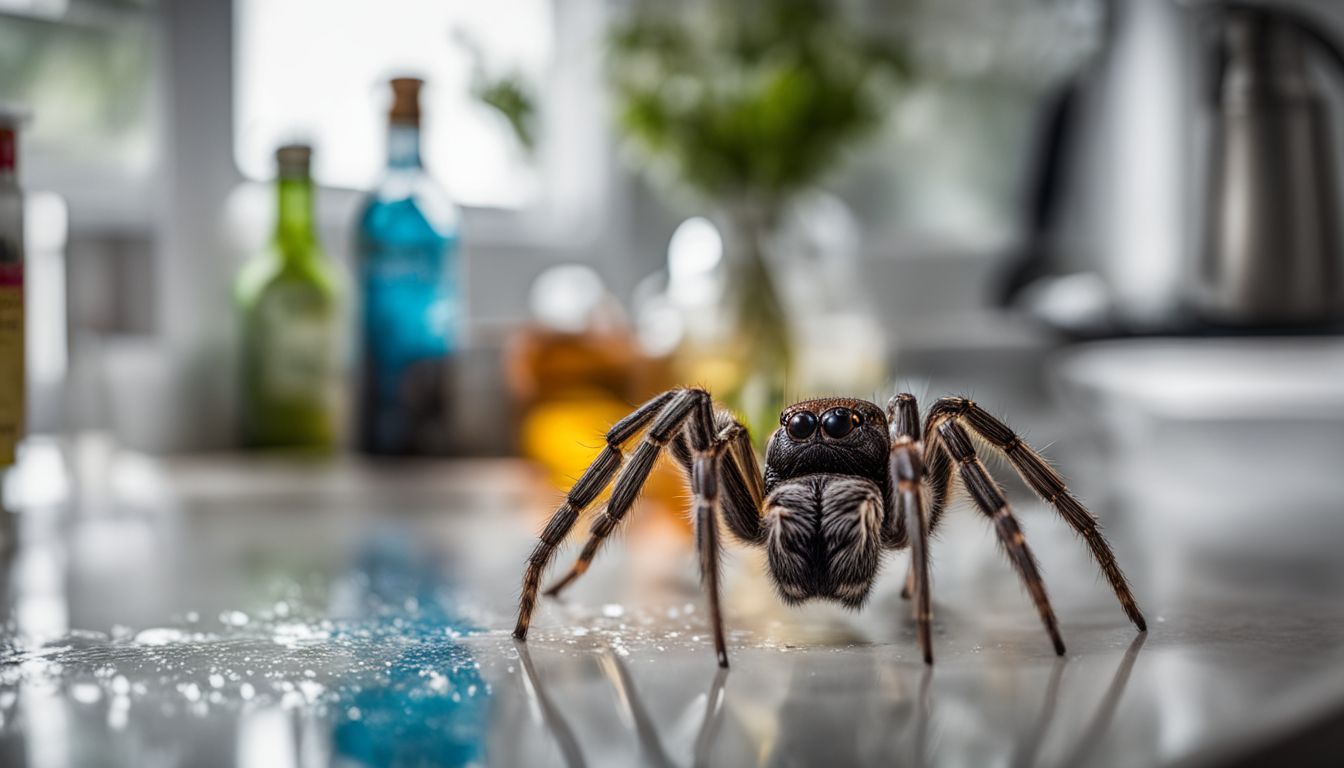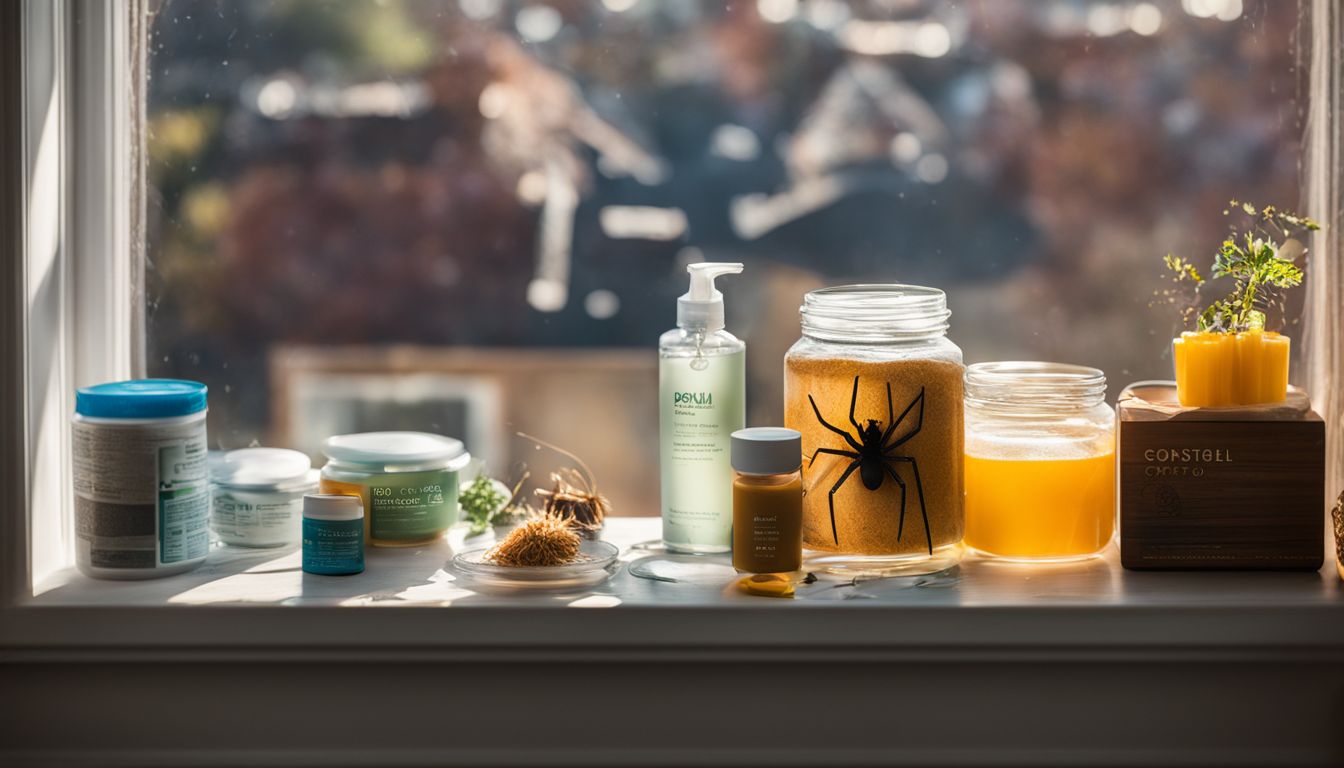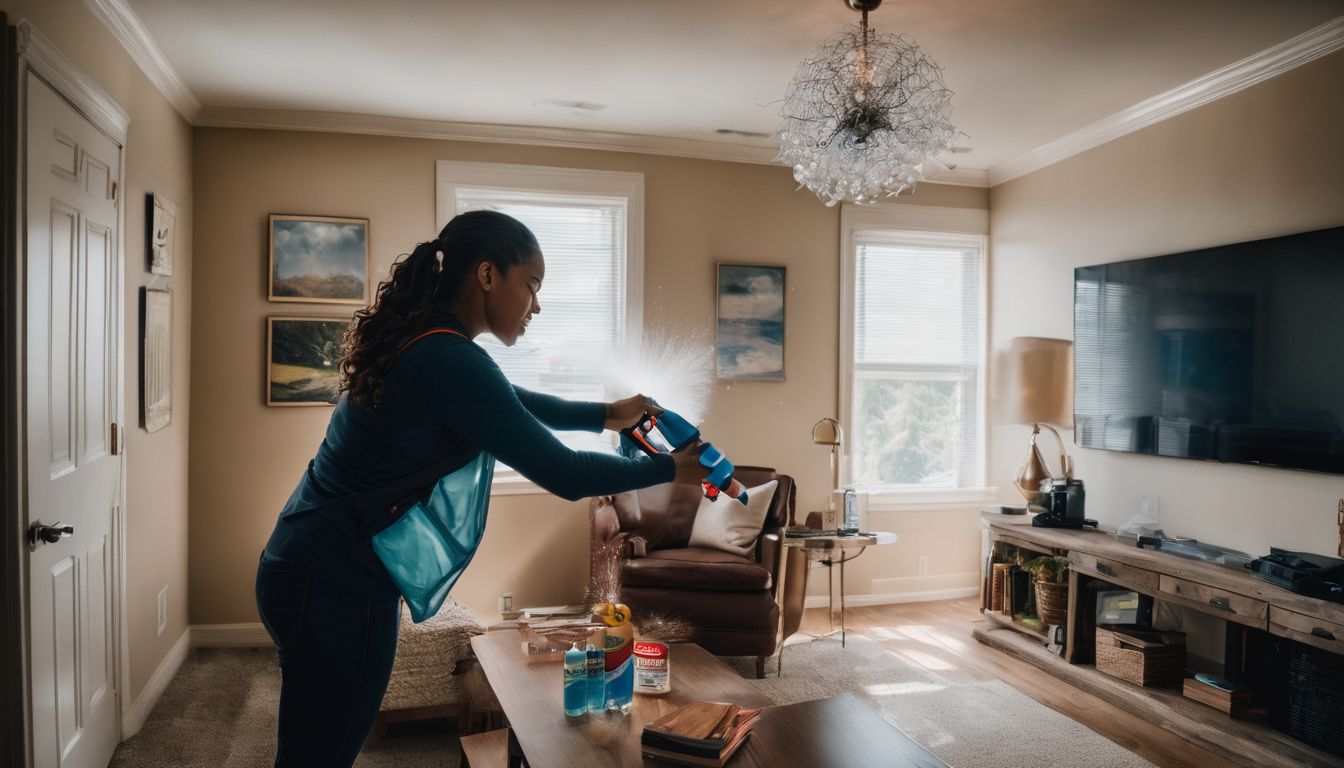Are you tired of seeing spiders scuttle across your home but not sure how to deal with them? Believe it or not, Windex, the common glass cleaner, has been a topic of discussion for its spider-killing abilities.
This article will explore the surprising truth about using everyday household cleaners like Windex against these eight-legged intruders. Keep reading to find out if you’ve got a spider solution under your kitchen sink!
Key Takeaways
- Windex, with its ammonia content, can effectively kill spiders by suffocating them upon direct contact.
- While it may quickly eliminate individual spiders, Windex is not a long – term solution as it does not repel or prevent new spiders from entering your home.
- Using a combination of methods, such as natural repellents and regular cleaning to reduce attractants, is crucial for effective and sustainable spider control in homes.
- It’s important to consider the safety risks associated with using chemical cleaners like Windex around pets and children, as well as the environmental impact of these products on the ecosystem.
Unveiling the Truth: Does Windex Really Kill Spiders?

Windex may be a popular choice for spider control, but does it really work?? We’ll take a closer look at the chemical composition of Windex and its actual impact on spiders to find out the truth.
The chemical composition of Windex and its impact on spiders
Windex has ammonia in it. This makes it a strong cleaning agent that can also kill spiders. The way Windex works is by taking away the spider’s oxygen. When you spray Windex on spiders, they can’t breathe and die quickly.
Using this cleaner on spiders does two things: it kills them and keeps others away. Even though Windex is not made to be a bug killer, it acts like one because of its toxic chemicals.
But we don’t know how well it stops black widows from coming around.
Personal anecdotes and reported effectiveness
Understanding how the chemicals in Windex affect spiders can be interesting, but what about real-life experiences? People often share their personal stories and results when using Windex against spiders.
- Many say that spraying spiders directly with Windex will kill them. They mention seeing the spider stop moving after being sprayed.
- Some people have noticed it takes a few sprays for Windex to work. A single spray might not do the job right away.
- Users report mixed results on Windex killing spider eggs. Results seem to vary depending on how much is sprayed.
- A few folks have tried using Windex to clean areas where spiders live, hoping it keeps them away. This method has had mixed success.
- There are stories of people who use Windex because they don’t want to touch spiders. They find that spraying gives them distance from the spider.
- Reports also exist where Windex did not kill the spider, but just made it more active. In these cases, another pest control method was needed.
- People often question if ammonia in Windex helps kill spiders faster. However, there’s no proof that ammonia works better than other ingredients in pests management.
- Concerns arise about using too much Windex for fear it might harm pets or kids if they touch the treated area afterward.
The Battle Against Spiders: Windex vs. Other Methods

Compare the effectiveness of Windex with traditional spider treatments and highlight its limitations for spider control. Understand how Windex measures up against other methods to combat spiders in your home.
Comparing Windex with traditional spider treatments
Windex stands out as a readily accessible solution when faced with an eight-legged invader in your home. Let’s look at how it measures up to more conventional spider control methods:
| Method | Effectiveness | Speed of Action | Application | Cost | Safety |
|---|---|---|---|---|---|
| Windex | Can be effective; contains chemicals like Ammonium hydroxide | Fast-acting upon direct contact | Easy to apply with spray bottle | Cost-effective, multipurpose cleaner | Caution advised around pets and children |
| Insecticides | Specifically designed to kill spiders | Varies with product | Requires careful application | May be more expensive than household cleaners | Toxicity levels vary; some may be harmful |
| Spider Traps | Good for catching wandering spiders | Gradual; relies on spider contact | Placement is critical for effectiveness | Low to moderate cost | Non-toxic and safer around children and pets |
| Natural Repellents | Variable; some spiders may be deterred | Generally slower; preventative | Regular application or setup required | Low cost; many DIY options | Safe for the environment and non-toxic |
| Professional Pest Control | Highly effective; tailored to the situation | Typically fast, but may require multiple visits | Done by professionals | Higher cost; ongoing contracts may be necessary | Varies; professionals aim to minimize risk |
Windex offers a quick and convenient option when dealing with spiders. Yet, understanding its limitations is key to proper home spider management. Moving forward, it’s also important to consider the safety implications and environmental impacts of our pest control choices.
Understanding the limitations of Windex for spider control
Windex may kill spiders when sprayed directly on them, but it’s not effective for long-term spider control. The chemicals in Windex aren’t specifically designed to repel or exterminate spiders over time.
While Windex can quickly eliminate individual spiders, it doesn’t address the root cause of the infestation or prevent new spiders from entering your home. It’s important to use additional methods alongside Windex for a more comprehensive approach to spider control.
Moreover, using only Windex for spider control may pose safety risks, especially if you have pets or children at home. Some of the chemicals in Windex can be harmful if ingested or come into contact with skin and eyes.
Safety Concerns and Environmental Impact
Evaluating the safety of Windex around pets and children is crucial for responsible use. Considering the environmental implications of using Windex as a pesticide also raises important questions about its overall impact on the ecosystem.
Evaluating the safety of Windex around pets and children
Windex contains chemicals that can be harmful to pets and children if ingested or inhaled. These chemicals, such as ammonia and isopropyl alcohol, can irritate the respiratory system and cause other health issues when exposed to them.
Therefore, it’s important to keep Windex out of reach of pets and children to prevent accidental exposure. Additionally, using alternative, pet-friendly cleaning products can help minimize the risks associated with chemical cleaners in households where pets or children are present.
Considering the hazardous nature of Windex around pets and children is important for ensuring their safety. Pets and young ones may not understand the dangers posed by household cleaning products like Windex, so taking proactive measures to store these items securely is crucial for preventing accidental ingestion or inhalation.
Considering the environmental implications of using Windex as a pesticide
When it comes to using Windex as a pesticide, there are significant environmental implications to consider. Hazardous household products like Windex can have long-term effects on the environment when used inappropriately.
The chemicals in Windex can be harmful to wildlife and pollute water sources, impacting the ecosystem. It’s essential to explore safer, more eco-friendly alternatives for pest control.
Using Windex as a pesticide can harm the environment in various ways. Chemical residues can affect soil quality and disrupt natural habitats for plants and animals, posing a threat to biodiversity.
Preventing Spider Infestations: Tips and Tricks
Keep spiders at bay by reducing their attractants in your home. Explore alternative, non-chemical methods to control spider populations and learn about the role of natural spider predators.
Strategies to reduce spider attractants in your home
To keep spiders away, follow these strategies:
- Keep your home clean and clutter – free. Spiders are attracted to dark, quiet spaces, so regular cleaning can help deter them from settling in.
- Seal up cracks and gaps in doors, windows, and walls to prevent spiders from entering your home.
- Remove any outdoor lighting near doors or windows as it can attract insects which in turn attract spiders.
- Use essential oils like peppermint or tea tree oil, known to repel spiders naturally, around entry points to discourage them from coming inside.
- Place spider – repelling plants such as lavender or eucalyptus near entryways and windows to keep spiders at bay.
Alternative, non-chemical methods to keep spiders at bay
You can keep spiders away without using chemicals. Here are some effective methods:
- Use spider catchers to gently trap and remove spiders from your home without harming them.
- Sprinkle peppermint oil in areas where spiders enter to deter them, as they dislike the scent.
- Create a mixture of dish soap and water in a spray bottle to kill spiders on contact.
The role of natural spider predators in controlling spider populations
Natural spider predators, such as lizards, birds, and spiders themselves, play a crucial role in keeping spider populations in check. By preying on spiders, these natural predators help maintain a balance in the ecosystem.
Lizards and birds also contribute to controlling spider populations by consuming other insects that spiders feed on, indirectly impacting the number of spiders in an area.
It’s essential to understand the significance of these natural predators when looking at ways to manage spider populations effectively without solely relying on chemical pesticides.
Having a diverse array of natural enemies for spiders helps maintain ecological harmony and reduce the need for excessive pesticide use that can harm the environment.
Conclusion
In conclusion, Windex can kill spiders when applied directly and generously. However, it may not prevent them from coming back. While it’s effective at killing adult spiders, there’s no specific information on how long it takes to work.
Other household cleaning products are also effective against spiders but may not repel them. When dealing with spider control, using a combination of methods may be most effective in keeping homes spider-free.
FAQs
1. Can Windex actually kill spiders?
Yes, Windex can kill spiders because it has chemicals like ammonia gas that are harmful to many kinds of bugs.
2. Are there other household cleaners that can get rid of spiders?
Sure! Household bleach and cleaners with boric acid or sodium dodecylbenzene sulfonate might work against spiders, just like they do on roaches and flies.
3. Is it safe to use these cleaners if I’m scared of venomous spiders in my house?
It’s okay to use them but be careful. If you’re dealing with venomous spiders, it might be safer to call someone who knows how to handle them right.
4. What about natural ways to keep away spiders without using harsh chemicals?
Natural options like borax (also called hydrogen borate or boracic acid) can help scare off spiders without needing stronger chemicals found in products like pyrethrins-based sprays.




